Social Media Fail: Let's Make Fun Of Mental Illness!
JOY—the fashion and lifestyle chain that has 26 locations throughout the United Kingdom—is the latest brand to create unnecessary controversy by tweeting something stupid.
The trouble started yesterday when a customer complained via Twitter about a greeting card that the store has for sale.
At first glance, I didn’t find this card offensive. But that’s the thing about offense: I don’t get to decide what’s sincerely offensive to other people; they do. And if a customer makes their sincere objection to this greeting card known to JOY, the company—at the very least—should know better than to antagonize the person who complained.
Instead, JOY said this:
The customer responded by tweeting:
To which JOY responded with its biggest error of all:
Now that offends me. To dismiss a polite customer who raises a sincere concern about stigmatizing mental illness by mocking people with bipolar disorder is completely beyond reason.
But Then They Made It Worse…
As is predictable in these situations, JOY apologized earlier today, but with one of those insincere, completely inauthentic apologies:
How, exactly, their tweets were intended to “create dialogue” about mental illness is beyond my comprehension. The company’s Facebook apology was even worse:
As their Facebook comments section shows, their customers aren’t buying it:
Why JOY’s Customers Shouldn’t Be So Quick To Forgive…
There have been far too many social media fails by this point for a brand to be quickly forgiven for committing its own. By now, they should know better—and if they don’t, their ignorance is no longer an excuse. There are only three possibilities in this case:
1. This is a deliberate strategy: It’s entirely possible that JOY is intentionally using outrage to spark a “crisis,” get attention for the brand, and increase name recognition. Giving credence to this theory is that Kenneth Cole—who has admitted creating these “social media crises” on purpose—apologized with almost the same response, that he was trying to “provoke a dialogue.”
2. The social media team is poorly trained: It’s 2014. There is no shortage of great consultants and experts available to help brands get their social media right. If the brand failed to train its staff properly, this incident is very much its own fault.
3. The employee went rogue. I doubt this one. Since the apology—which should have involved executives—had the same unapologetic tone, this incident strikes me as far more reflective of the brand than an exception to the rule.
UPDATE: SEPTEMBER 22, 2014, 1:16 p.m. Eastern U.S. Time
JOY just issued its second apology in as many days. Unfortunately, this apology comes only after botching the first apology. As a result, its sincerity will immediately be called into question by many people—including me—who wonder why a heartfelt apology should take two takes to get right.
Even though this apology is better than the first, it’s still not great. The store is placing the blame onto a staffer, but not acknowledging that management itself bears responsibility for insufficiently training its staff or for making the wrong person responsible for its Twitter feed.
What do you think? Please leave your thoughts in the comments section below.
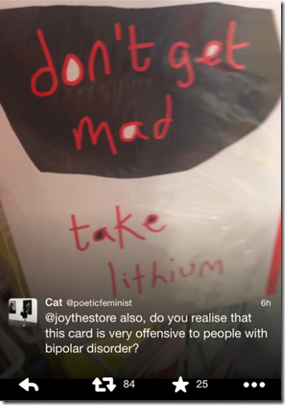



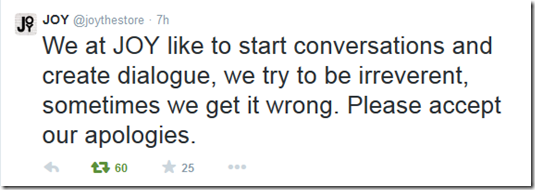
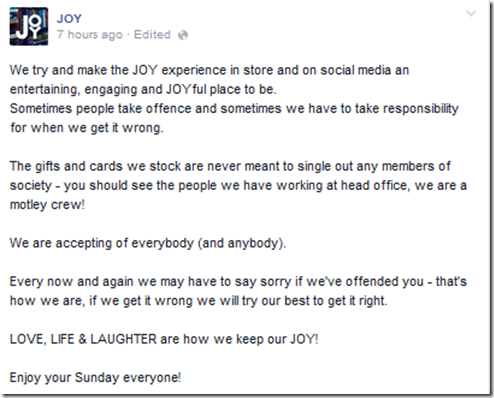
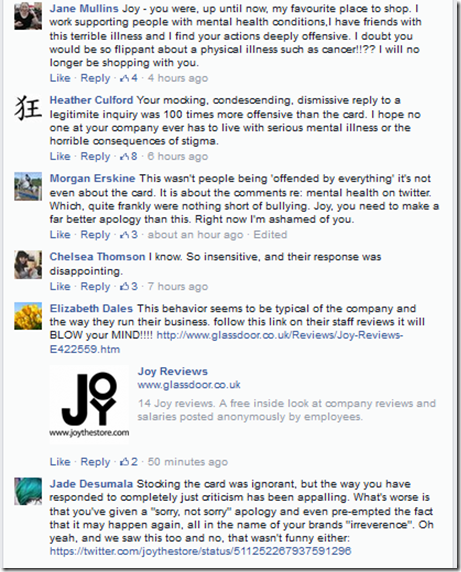
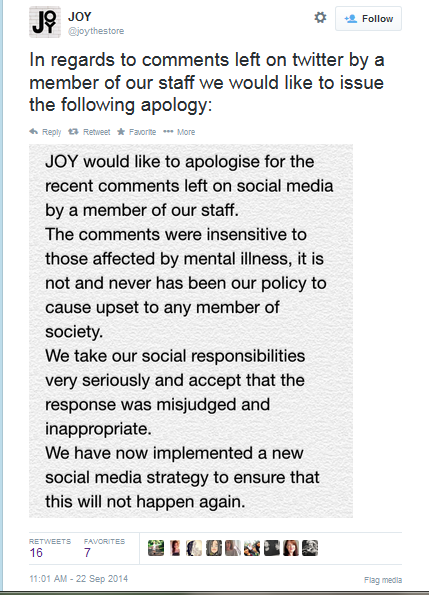



I was one of the customers that wrote on the face book in your screen shot, I then got a message from another person saying that everyone should read my link. I can honestly say it seems that they are not only unprofessional and rude and seem to be very dismissive. But in fact when i read up on the company, they seem to treat there staff badly which shows that it could quite possibly be number 3 of your “Why JOY’s Customers Shouldn’t Be So Quick To Forgive”. Maybe an employee just had enough. Anyway I do feel sorry for there staff and if you have a huge following maybe you should help them. I later went on to Facebook to respond to the person that liked my comment and they have blocked me and i can no longer comment on there feed. Honestly i am just disgusted. Check out this link. http://www.glassdoor.co.uk/Reviews/Joy-Reviews-E422559.htm
I wonder if people were always so quick to be “outraged” (a word rapidly losing its impact) or if social media gives us the avenue to be that way.